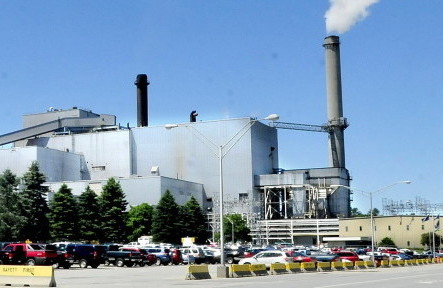A legislative amendment introduced by U.S. Rep. Bruce Poliquin, R-2nd District, won approval Tuesday night from the U.S. House of Representatives as the congressman targeted what he says are harmful effects of the Environmental Protection Agency’s new rules aimed at reducing air emissions from paper mills such as those from Sappi Fine Paper in Skowhegan.
Without the amendment, the S.D. Warren Somerset mill on U.S. Route 201 and other mills would be required to spend millions of dollars to comply with new Environmental Protection Agency regulations, according to Poliquin. The amendment, which kills funding for the EPA’s new Boiler MACT regulations, was introduced Tuesday night and passed shortly afterward.
It will be included in H.R. 2822, broader legislation that is the Department of the Interior, Environment, and Related Agencies Appropriations Act of 2016.
Poliquin and Republican Rep. Mick Mulvaney, of South Carolina, originally described their concerns about new boiler regulations in a letter last month to EPA Administrator Gina McCarthy. They said the rules could cause the Sappi paper mill in Skowhegan and a mill in South Carolina to be required to spend millions of dollars to comply that could “otherwise be invested in efficiency, safety and job creation.”
Poliquin said increasing costs forced three Maine mills to close last year, causing nearly 1,000 workers to lose their jobs.
“The success of the papermaking industry depends, in part, on fair, consistent and predictable environmental regulations administered by your agency,” the congressmen wrote in the letter to McCarthy. “In our respective congressional districts, paper mills provide high-wage jobs to thousands of hard-working constituents. During the past several years, paper mills in our districts have worked diligently to comply with the Boiler MACT regulations.”
Tim Hunt, senior director of Air Quality Programs at American Forest & Paper Association, said Poliquin’s amendment prevents the EPA from starting a lengthy rulemaking process and instead returns the decision back to the states for the necessary adjustments to measuring factors of opacity, or the quality of not letting light pass through a mill’s smoke emissions.
Hunt said EPA’s general regulations and Boiler MACT specific regulations give states the authority to adjust opacity parameters as long as the underlying particulate matter limit is being met. Particulate matter is the primary source of airborne emissions from paper mills and the standard for compliance. Sappi meets the limit but needs an alternative opacity parameter that works for them, he said.
However, because of the unique paper manufacturing process that varies boiler load, fuel quality and moisture content, the mills at times measure above the 10 percent opacity operating parameter.
Poliquin defended his amendment when speaking on the House floor early Tuesday evening, saying Maine has a “pristine natural environment” and “it’s something we will continue to protect at all costs.”
Opposition came from Rep. Betty McCollum, D-Minnesota, who spoke against Poliquin’s amendment on the House floor by saying it amounts to a “blanket block from enforcing air toxic standards.” McCollum said there’s already “flexibility within the rules” for the EPA, which “is looking at this right now; they’ve heard the concerns.
“This amendment, unfortunately, does not make any sense to me,” she said.
But Poliquin fired back.
“As a freshman legislator — I’ve been here for six months — and what I have learned in those six months is that we have almost a fourth branch of government, and that’s these regulators that regulate every part of our life, whether we’re trying to make paper or provide work for our families,” he said.
Willy Ritch, spokesman for U.S. Rep. Chellie Pingree of Maine, D-1st District, said Pingree supports clean environment measures and hopes that the EPA remembers how much paper mills such as Sappi have done to comply with existing regulations.
In a statement, however, Pingree indicated that she disagreed with Poliquin’s approach.
“I think it’s important that the EPA takes into account steps that mills like Sappi have already taken to clean up their emissions, and I think that Sappi has some valid complaints about how their emissions are measured,” Pingree said in the statement. “But I think there is a better way to address these issues than by tying the EPA’s hands on enforcing these clean air regulations all across the country.”
Representatives at the Maine Pulp & Paper Association did not return a call for comment immediately Tuesday.
Olga Karagiannis, manager of corporate communications at Sappi North America offices in Boston, said the company appreciates all the help it can get in Washington to preserve jobs in Maine.
“We appreciate the efforts of members of the Maine congressional delegation for their support in ensuring that the paper industry in Maine can continue to operate competitively in an environmentally responsible way,” Karagiannis said in a company statement.
Doug Harlow — 612-2367
Twitter: @Doug_Harlow
Copy the Story LinkSend questions/comments to the editors.





Success. Please wait for the page to reload. If the page does not reload within 5 seconds, please refresh the page.
Enter your email and password to access comments.
Hi, to comment on stories you must . This profile is in addition to your subscription and website login.
Already have a commenting profile? .
Invalid username/password.
Please check your email to confirm and complete your registration.
Only subscribers are eligible to post comments. Please subscribe or login first for digital access. Here’s why.
Use the form below to reset your password. When you've submitted your account email, we will send an email with a reset code.